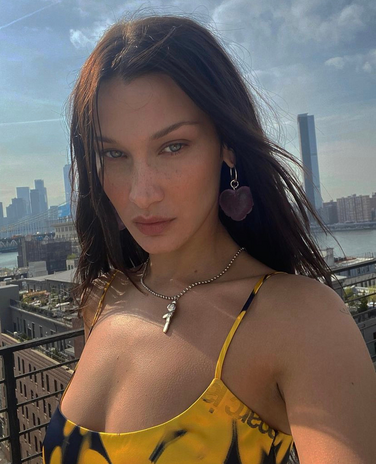On May 15, Bella Hadid took to Instagram to post in support of Palestinian freedom, amid the ongoing, decades-old Israeli-Palestinian crisis. Over the course of the past month, Hadid, who is half Palestinian, shared numerous infographics, as well as her own opinions, writing, “It has always been #freepalestine… This is not about religion. This is not about spewing hate on one or the other… I stand with my Palestinian brothers and sisters, I willl protect and support you as best as I can.” Hadid has also publicly condemned all forms of anti-Semitism and hate, urging her supporters to recognize that the issue lies in securing Palestinian liberation and advocating for human rights.
Although Hadid has been praised by some for speaking up, her vocal support has also sparked some controversy, with the state of Israel’s official Twitter account calling Hadid out for “advocating for the elimination of the Jewish State” through her rhetoric.
Hadid has not been the only celebrity to speak up about important political and social issues. After the murder of George Floyd in the summer of 2020, celebrities such as Ariana Grande, Beyoncé, and Harry Styles used their platforms to post in support of Black Lives Matter, educate their followers about police brutality, and call them to action. Keke Palmer even went viral on Twitter for her captivating speech at a Black Lives Matter protest. Celebrities have also their platforms to spread awareness about the recent rise in anti-Asian hate crimes, including Rihanna and Tennis star Naomi Osaka, who took Twitter, writing, “Imagine profiting/enjoying things that come from a culture and then attacking/diminishing the ethnic group that created it.”
“She is a real human person with ideals and values, and just because she is a celebrity with a big platform doesn’t mean she shouldn’t speak on it.”
But the question is: When is it a celebrity’s place to speak out about these issues? People have argued both that celebrities should stick to their crafts and that it’s their responsibility to post, because their large audience gives them the ability to effect real change for good.
Matthew, 21, an incoming senior at Texas Christian University, says that Hadid has the right to do as she pleases. “I don’t think being a celebrity should stop her from voicing her opinions on it or voicing what she wants to say about it,” he tells Her Campus. “I think she’s well within her rights to do that, but she will definitely be met by more controversy than a normal person would be [because she is a celebrity].”
He’s not the only college student who feels that celebrities should be able to voice their opinions. Bailey, 21, an incoming senior at Loyola Marymount University, agrees with Matthew. “She is a real human person with ideals and values, and just because she is a celebrity with a big platform doesn’t mean she shouldn’t speak on it,” she tells Her Campus.
“It personally has helped me learn about the conflict. However, she is not my only source of information.”
Of course, not everyone is in agreement. Some people think that celebrities shouldn’t speak about politics at all and that, as reported by Forbes, believe celebrities actually harm their causes by speaking up. According to Forbes, a 2019 survey found that almost a quarter of respondents were less likely to vote for a political candidate with a celebrity endorsement. With Hadid being accused of anti-Semitism for her views, it’s easy to argue that speaking up can fan the flames of an already high-tension issue, and that she should just stick to modeling. The other side of the argument points to the fact that celebrities have the ability reach a wider audience than the average person; if they have the chance to make a change or bring awareness to someone who wouldn’t have known otherwise about an issue, deliberately not taking that chance seems complacent or uncaring of others’ suffering.
Ava, 20, a rising senior at University of Wisconsin-Madison, believes that Hadid has a right to speak on the conflict due to her heritage and understanding of the conflict, but that most celebrities may not be in the right position to discuss it. “In Bella’s case, I do believe she is passionate and has strong ties to the issue,” she tells Her Campus. “I would give her more authority than a random celebrity who just learned about the issue, but I also would not just take her word on the issue. I have consumed some of the media she has spread and it personally has helped me learn about the conflict. However, she is not my only source of information and I have also directly gone to the pages she promotes for more information and other resources.”
Having other sources of information is key: informed celebrities can use their platforms to spread awareness, but it’s on us to seek out more reputable resources and educate ourselves appropriately. It’s a double-edged sword, because just as we expect celebrities to shine a light on certain issues (often within a certain amount of time), we also don’t want them to speak without having acquired adequate knowledge.
“Celebrities are people too, they have just as much moral obligation as any [other] person to help in whichever way best suits them.”
“I only think that celebrities should use their platform to elevate an issue if they are knowledgeable and feel that they want to speak on the issue,” Amanda, 19, an incoming junior at Loyola Marymount University, tells Her Campus. “I think it’s unfair for people to put pressure on celebrities to speak on things if they are not knowledgeable on the subject; just because someone is famous does not make them also forced to use their platform to touch on political issues.”
While some college students believe it’s unrealistic to hold celebrities to the high standard of being an authority figure on each issue, others believe that they have a moral obligation to raise awareness. “I think the narrative that celebrities and athletes shouldn’t comment on political or controversial issues is unfounded,” Maddie, 21, a rising senior at University of Florida, tells Her Campus. “Because celebrities are people too, they have just as much moral obligation as any [other] person to help in whichever way best suits them, and for many celebrities, this likely includes using their social platform.”
Although celebrities speaking up about social and political views on social media has perhaps been contested in the past, raising awareness and educating others is an important step towards reaching systemic change. That said, we can’t expect celebrities to be our main source of information about issues in the world — it’s on us, as citizens, to seek out proper resources, formulate our own opinions, and stay informed, regardless of whatever our favorite influencer says.


